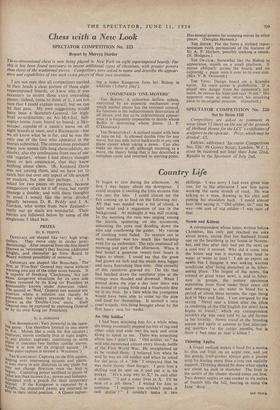Newts and Kittens
A correspondent whose letter, written before Christmas, has only just reached me asks about newts, saying that her husband found one on the hearthrug in her house in Novem- ber, and that after they had put the newt on a cool tray it revived. Why did it come into the house and was it moving from land to water or water to land ? I am no expert on newts but I imagine it was seeking warmer conditions after being disturbed in its hiber- nating place. The largest of the newts, the crested or great water newt, is said to hiber- nate in groups, the mature specimens separating from those under three years old and returning to the water to breed for a period of about three months, the eggs being laid in May and June. I am intrigued by the saying "Never rear a kitten after the effete (a rendering of the Old English for newt) have begun to travel," which my correspondent remarks sly was once told by an old farmer in her locality. Newts travel at the breeding season and again in autumn to find hibernat- ing quarters for the colder months, but is there a bad time to rear a kitten ?


































 Previous page
Previous page